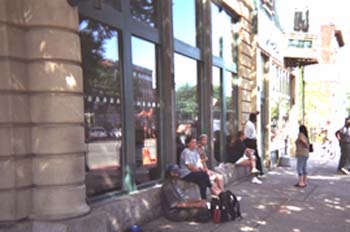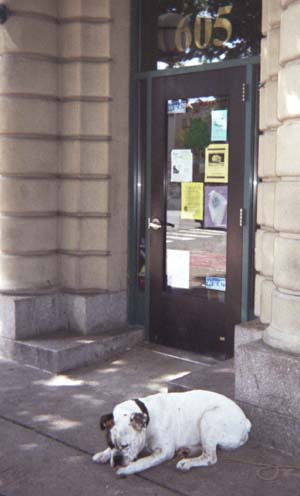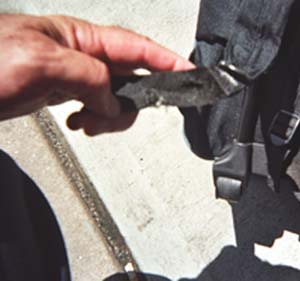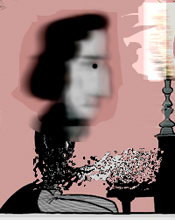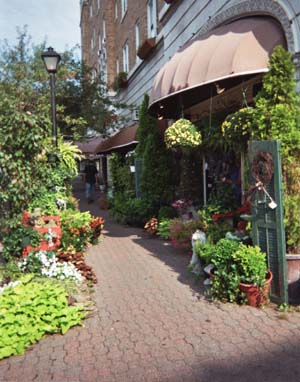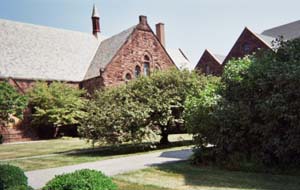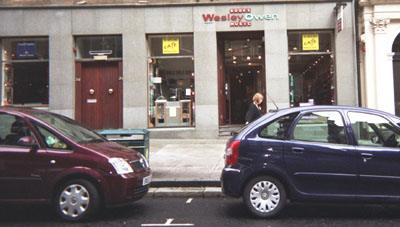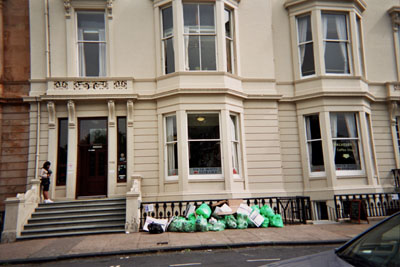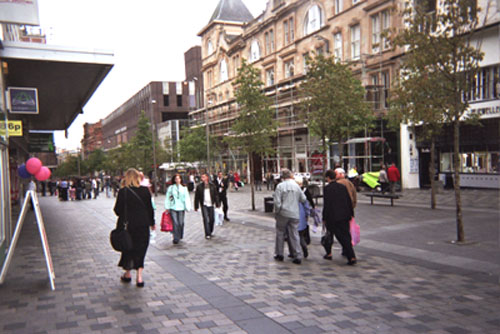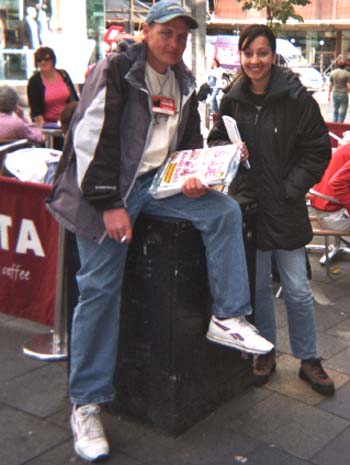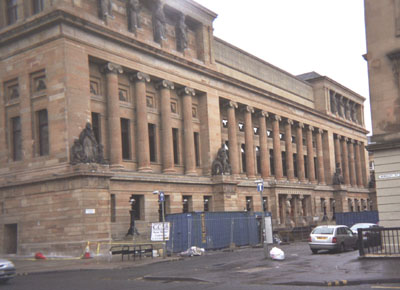Travelogue: Scotland 8/25/06-9/8/06
Episode 1:Departure
August 22-24, 2006
August 22 : Middletown, Connecticut ; Montclair, New Jersey; NYC, New York
The community of homeless , recovering alcoholics, drug addicts and other impoverished persons eating at the St Vincent de Paul Soup Kitchen around the corner from my apartment building, fans out over half the block on the west side of Main Street. Among them is a man with a background of circus and carnival work. His experience when coming to an unfamiliar place is that the people there are as interested in finding out about where you'd come from, as you are in learning about them. Following up on his advice I took a number of pictures of street scenes and friends in Middletown:
The community on the corner of Liberty and Main
The person I spoke with can be seen sitting in the shade outside the large windows of the Buttonwood Tree performance space.He's middle aged, speaks in a very soft voice. His salt-and-pepper beard complements a puzzled, though not unintelligent look. He probably stays at the Eddy Homeless Shelter. One can see him walking down Main Street with his dog on a leash and a large blue pack strapped onto his back. The St Vincent de Paul soup kitchen is next door.
On the corner outside the Buttonwood Tree stands a large buttonwood tree . Perhaps because of the long association of Antan with Judaism going back to the Middle Ages, the Duchesse d'Antan often officiates at memorial tree planting ceremonies for victims of the Holocaust. When I learned that she had been present at the re- dedication of the Anne Frank tree in Amsterdam in February of this year, I decreed this tree to be Middletown's Anne Frank sister tree .
The Duchesse dedicates the Anne Frank Tree
Amsterdam,February, 2006

I designate the buttonwood tree,
outside the Buttonwood Tree performance space,
as Middletown's sister Anne Frank Tree
March 2006
This information was sent along to the Anne Frank House in Amsterdam. A month later I received this letter from its director:
"Dear Mr. Lisker: Thank you for your suggestion. At this moment we are still making an
inventory of what we would like to organize around the real and the
virtual tree. Our sister organisation, the Anne Frank Trust, has already
planted Anne Frank Trees in the UK, and we also heard about an 'Anne Frank
forest' in Israel. The Anne Frank House will be discussing this subject
internally in the near future."
Best regards,
Fiona van Rees Vellinga
Anne Frank House
The dog's name is Malachi. He's a fiendishly ugly creature. His remarkable gentleness endows Malachi with a special appeal, and I pat him on the square mesa of his head whenever I go by him.
Malachi outside the Buttonwood Tree
Deborah Parmelee is the monitor in my apartment building, a supportive housing complex called Liberty Commons. She sits behind a half wall of glass at the reception desk of a darkened cubicle. Debbie was born in Scotland and her mother and father still live north of Perth in an area named the "Gateway to the Highlands".When Debbie learned that I intended to vacation in Scotland she called her mother to ask her about cheap, or at least affordable, accomodations for me. Her mother recommended the Tourist Information Offices in the towns where I intended to stay, which supply directions to nearby hostels.
Debbie outside Liberty Commons
Youth Hostels in the UK do not have the stigma attached to them in this country. Perhaps stigma isn't the right word. The public perception of a Youth Hostel in the United States is of a somewhat unclean lodging with bedbugs and cockroachs crawling about, where teen-agers run wild during the day, and college kids carouse all night. "Adulthood" In general is characterized by a host of infantile fears, including the terrors of embarrassment. Many grown-ups fear that anyone over the age of, say, 22, will be brusquely ejected.
These prejudices are completely in error. Youth hostels in most countries are open to travelers of any age. In the UK, no-one willing to forgo a bit of comfort in exchange for low-cost lodgings, hesitates before booking a bed in a youth hostel.
I quickly discovered that, in the US, as soon as one states an intention to visit Scotland (or Ireland ) , everyone turns out to be an honorary Scotsman (Irishman) ! He or she will begin humming the Loch Lomond ballad, telling you stories about the great-aunt thrice removed who lives there, remind you to say hello to Nessie for them , and encourage you to get drunk at least once, on real whiskey.
I was unable to get to Loch Ness, but I did uncover evidences of a monster in Loch Lomond. To be related in its proper place!
Here are some more photos of local friends:
Cynthia, manager Broad Street Books, Middletown
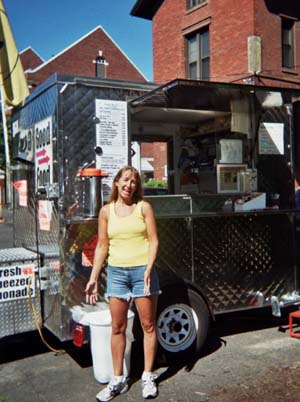
Anne-Marie, cook and waitress
in a short-order vendor's truck
on Court Street
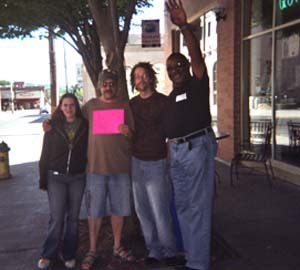
Megan, Rick, Curly and Fred
baristas and customers from the Klekolo Coffee Shop on the same street.
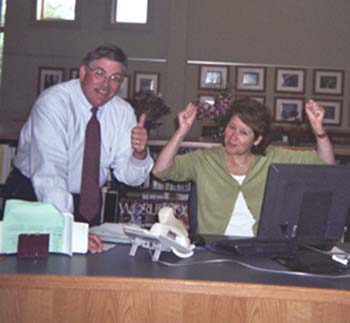

The librarians at the Information Desk of the Russell Library
wishing me a grand time in Scotland.
As is so often the case, my vacation abroad was prefaced and postscripted by a few days in the house of Jacob Smullyan and Anne-Marie Hantho, and their 3 rambunctious, obstreperous and chaos-addled junglings, Benjamin, Jeremy and Gabriel ( in descending order of birth). Their faces appear on the home page of Ferment Magazine. Without Jacob (gifted pianist and music teacher, nephew of logic popularizer, Raymond Smullyan ), there would be no Ferment Magazine.
In the 21st century, getting from Middletown, Connecticut to Montclair, New Jersey by public transportation is no easier than it was in the 17th. I neither own nor drive a car, perhaps because to become an automobile driver would complicate my endemic identity crisis, possibly as a kind of permanent political demonstration against war. In the great majority of all real-life travel situations this causes me no inconvenience. It is also cheaper and safer, and makes it that much harder for them to track me down. It must be admitted however, that a conspiracy of oil, automotive and political interests in this country does its damndest to force all honest citizens to own and drive a car!
On any weekday one can take a local (1) jitney from Middletown, Connecticut to the neighboring village of Meridan. This is best done around 12:30. At 1:30 or so one boards an (2)Amtrak shuttle from Hartford, arriving in New Haven in about 25 minutes. Another 45 minutes wait in New Haven's Union Station and one boards the (3)Metro-North train to Grand Central Station. There one takes a (4)#7 subway shuttle train to Times Square, where one transfers to a (5)#1 downtown train to Penn Station. Here, after another wait in rush hour traffic, one loads onto to pick up a (6)New Jersey Transit train to Bay or Walnut staions in Montclair.
With senior citizen discounts everywhere along the way the cost is low, somewhere around $15. With good connections, one can leave Middletown at 12:30 and arrive in Montclair around 7:30 . That is to say, 7 hours of travel and 6 changes of vehicle, for a distance of about 100 miles, an average of 15 miles per hour, about what a good bicyclist can do. In exchange one avoids road rage and gridlock.
It was while I was standing on the platform of the Meridan train station, in the strong sunlight of a cloudless sky, not be seen again until my return from Scotland, waiting for the 1:38 Amtrak shuttle, that I noticed that the shoulder straps of my backpack were severely chewed up, as if a pet or rat had gotten to them. The backpack was light and sturdy when I'd bought it, and appeared to be virtually unused. Admittedly I'd only paid $5 for it in a Thrift Shop, an indication that I should have been more thorough in my inspection. These photographs, taken at the Meridan station, show the extent of the damage.
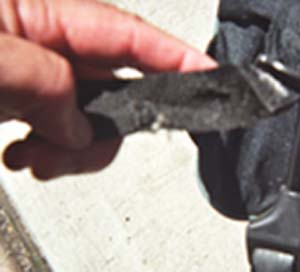
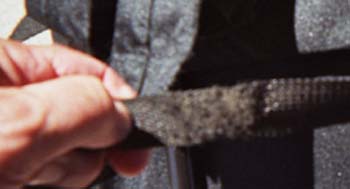
A new backpack or its equivalent had to be found right away, if not here then in Scotland.
Luggage assembled for the trip: back pack, suitcase and shoulder-bag.
Within a few days every item had to be discarded or replaced.
On the Metro-North train down to New York from New Haven I listened to a tape of the Chopin Preludes performed by Walter Klein. It reminded me of the generous support Chopin received from the Duchesse Euterpe d'Antan in the 1840's. There is no proof that the Preludes were not written there. In any case I understood why there are no fugues to complement the preludes: Fugue writing is a specialized craft: fugues were out of fashion in the 19th century and Chopin wasn't taught how to write one.
Chopin at the Chateau de Courge, Antan 1839
He despairs of composing a fugue.
I arrived at Grand Central at around 4:30. To get from the lobby of Grand Central to the shuttle trains for Times Square, one walks to the southwest corner of the station, through a set of glass-panelled doors, then turns right to reach the area of ticket booths, automatic ticket machines and mechanized turnstiles. One graces through these with the graze of a Metrocard, then canters down a steep staircase onto a solid rectangular block platform. Here one usually finds a street musician whom I tip when possible. From this platform 4 four parallel tracks protrude like claws from a bird's heel , two pairs of outer and middle track seperated (sic!) by a platform. The outer tracks hug the left and right containing walls, while the two middle tracks delimit the large platform at the center. Unlike most subway stations in New York, the space is well illuminated.
Descending onto the platform I followed a mass of humans surging towards a shuttle train standing by the left wall. Our attempts to enter were blocked by the entire population of the train being ejected by a fire inspector. Swollen in numbers, we joined an already dense crowd waiting for the train due to arrive on the middle track of the same platform. From where we were standing we could make out another train stationed on the outer track against the right wall, filled up and looking as if it were about to leave.
Its doors shut - in a few minutes they sprang open again. Once more its entire contents were spilled out onto the platform. Soon afterwards 3 firemen with blackened faces, wearing heavy yellow protective rubber coats and helmets and carrying such oversized tools as a long-handled axe with and an elongated flashlight, walked past us into the station.
The next phase was admittedly rather strange. The doors of the train began quaking in an agitated fashion, almost as if whoever was managing the levers could not decide if they should be opened or closed. While this was going on a dribble of newly arrived passengers began running back towards the swinging doors. As the quaking of the doors became yet more pronounced, so did the acceleration of the passengers rushing to get on-board. To us the sight was very comical, as if the New York subways were presenting a side-show to keep us from being bored. Finally the doors slammed shut, and the train, a mere handful of passengers on board, pulled out.
Then an announcement came over the loudspeaker. Due to a "fire investigation", the far left platform was being closed down completely; all of us were instructed to move over to the far right platform . A mass exodus carried me along with it over to the right platform where, in due course a train entered the station on the middle track. In great haste we overcrowded on.
Even as we were waiting for the train to move, a new train had pulled onto the outer left track. Already passengers were climbing aboard! I asked the pretty young lady in front of me, squeezed, like most of us, to a narrow pulp: "What's happening ?"She laughed in commiseration: " The fire inspection's just ended! "
August 23: Montclair, New Jersey
Flower Shop in Montclair, Hew Jersey
It's a habit of mine, when I stay with the Smullyans, to leave the house before 8 to take a coffee and pastry in town. Necessity obliges me to go to the Starbucks about a mile away, though I don't really like its coffee and strongly disagree with its politics. Normally in the mornings one sees 4 or 5 homeless people on this street, Fullerton Avenue . Many of them sleep on the benches and lawns of the public library.
In the vicinity of the St Luke's Church I encountered a world-weathered yet friendly derelict. Wry smile, unsteady gait, deep furrows in brow, red shirt, minimal white beard clinging with wistful desperation to the point of his chin. He sized me up as a fellow derelict - not far wrong - and welcomed me to return at 11:30 for a free meal at the Soup Kitchen . The Church of St. Luke (author of the most anti-Semitic of all the gospels ) combines a soup kitchen, food pantry and clothing room under a Gothic archway. The Smullyans see to it that I'm well-fed; natural curiosity and the quest for a good story however led to my return at 11:30.
St. Luke's Church
The dining area of "Toni's Kitchen" is the size of a meeting room or rehearsal space and is slightly below ground level. It has a low ceiling and high windows that provide adequate sunlight . A series of windows cut into the wall to the right from the entranceway serve as food delivery counters. In front of them stood a table holding cups of ice tea. At 11:30 there were no more than a dozen clients in the room, sitting around 9 tables each holding 6 dinner settings. The meal did not officially begin until noon.
While we waited a young Hispanic waitress began walking back and forth between the tables handing out cracker sandwiches of peanut butter and jelly, cups of iced tea and paper cups of nuts. She wore a dark brown apron with the logo "Toni's Kitchen" printed on it, a yellow blouse and sneakers, her black hair done up in a bun. She kept coming back with more cracker sandwiches until I began to fear that this would be the only lunch we were likely to receive.
"Is there a lunch coming?" I asked one of the regulars at my table.
"Yes, just wait"
" Do we have to walk to the front to pick it up?"
"No", he laughed, "They throw it at us!" He was in a jovial mood. By 12 noon all 9 tables were filled. There must have been 50 people sitting there: black, homeless, derelict, mental hospital releases, poor people. To its credit, St Luke's church is situated in an affluent neighborhood. The opinions of Mr. Luke notwithstanding, the Beth Keshet "reconstructionist" schule and synagogue are virtually next door; on its lawn is a banner addressing the plight of the victims in Darfur.
To my right sat a taciturn middle-aged man rocking with the recognizable spasms of tardive dyskinesia. An identification badge dangled at the bottom of a plastic strap around his neck. A set of keys on a metal chain went into his right pocket. His shirt was the color of Orangina. his trousers a drab tan. In contrast the person to my right wore a entirely black jogger's jump-suit. In the evenings,he explained, he attends AA meetings in the same room
Finally the meal was ready. The young waitress strode to the front of the room accompanied by a short black woman who declaimed a prayer, in gospel style and with gusto. Then the waitress broke into a great smile and cried: "Let's eat!!".
The meal had been donated by Whole Foods, ( located coincidentally next door to the Starbucks where I'd taken breakfast) . After a tasty vegetable soup came a varied selection of wrapped sandwiches, one of which I saved to be eaten later at the JFK teminal. Rounding off the meal were delicious cantelope slices. What was refreshing about this meal was a decided lack of moralism, the hygienic cleanliness of the dining-room, and a real concern that the clientele should feel the happiness that comes with participation in a community event.
August 24-25 : Montclair, NYC, the Atlantic Ocean , Keflavik, Glasgow
At 3 PM on the afternoon of Thursday, August 24 I said goodbye to the Smullyan clan and waited at the Bay Street Station in Montclair for the arrival of the New Jersey Transit train bound for New York. Upon arriving at Penn Station, following instructions received at the Sanditz Travel Agency in Middletown, I walked out onto 7th Avenue at 33rd, crossed over and went to the front of the Pennsylvania Hotel to find a SuperShuttle van bound for JFK.
The fare was $17. By the time we reached Terminal 7 at JFK I gladly handed him another $3 as a tip, an inadequate enough payment for the display of labor and ingenuity he'd show in cutting through rush hour traffic to get me there. A strong, stocky Jamaican who , although he spoke little, gave evidence of a good sense of humor when he did . After dropping off what appeared to be a married couple ( One can never be certain about these things. They could have been involved in a host of similar personal situations, including complete absence of relationship. The amount and kind of wear-and-tear on the demeanour of both of them made it very likely that they were in fact married. On the other hand, the bedraggled effects of domesticity may have been acquired in seperate individual marriages before they met and decided, etc..... ) at a hotel downtown , he bravely tackled a block-by-block climb through heavy traffic , up 3rd Avenue into the 50's, turning right to skirt the UN and cross the bridge into Queens.
The going was a bit easier there for awhile, but as soon as we came within the vicinity of JFK the mean vehicular density (mvd) and the number of long waits in logjams (lwlj) returned in full strength. A trip that under normal circumstances would have taken no more than 45 minutes took almost 2 hours.
Lurching into the ground level of Terminal 7 I stepped into one of the lines waiting to check in with Icelandair. Owing to recent hysterical over-reactions to hypothetical chemical bomb plots in the UK, I'd been advised to cut down on carry-on hand luggage as much as possible. Accordingly, the shoulder bag had been left at the Smullyans. Instead a Whole Foods tote-bag dangled from my left shoulder. This created a certain amount of awkwardness when it came time to remove or replace my wallet, plane ticket and passport. Digging into the tote-bag I retrieved the passport, then looked around for the wallet. The wallet was gone.
This would prove to be only the first ( albeit worst ) of a series of misfortunes that would overtake me within the next 24 hours. A frantic search of my jacket and trouser pockets failed to uncover anything. I stepped out of line, sat down in a chair alongside the wall and searched my luggage: a pointless activity because both the suitcase and backpack had been sealed with combination locks.
Over me there settled a feeling of panic interlaced with as much equanimity as I could reasonably muster. If the wallet couldn't be found the trip to Scotland would have to be cancelled. The possibility made me somewhat unhappy, although it accorded well enough with my theory that the Fates have decreed that I should never in this lifetime meet up with the Duchesse, the kind of confident pessimism that justifies the joys of mediocre comfort and the disparagement of all initiative.
The wallet had probably been left on the back seat of the SuperShuttle. Or it could have been dropped on the sidewalk outside the terminal - (I rushed out to look )- or on the pavement at 33rd and 7th Avenue! It did not hold my passport, and most of my money was safely stored away in the luggage. What it did hold were about a hundred dollars, the essential palette of magnetized plastic cards, a stack of calling cards, valuable addresses on bits of paper, and pictures of the Duchesse to show to people in my search for her, ( hardly necessary, given her notoreity both in terms of fame and infamy). Both plane ticket and passport were safely inside the tote bag.
I reflected that the hideousness of contemporary political events had intruded itself into my life in an extraordinary fashion. Had I not replaced my standard carry-on bag with the tote-bag, the wallet would never have gotten lost. Cursing the current triumph of Democro-fascism I took the escalator down to the next level. The personnel at the Ground Transportation Office, and Baggage Services, were anxious to help, although I couldn't give them the name of the driver, or the number of the SuperShuttle van, or whatever they would have to know that I didn't. I was advised to return upstairs and wait in the lobby; they would page me if there were developments.
Stepping off the escalator onto the ground level I narrowly missed a collision with the SuperShuttle's Jamaican driver. He'd just come in through the front door, laughing wildly, my wallet in hand! A fortuitous encounter. The ready excuse of confusion due to old age, ( pitiable at best: my confusion at age 24 was far greater than anything I've known since) was accepted with sympathy, the wallet eschanging hands, followed by handshakes, guffaws, backslapping, the works. He returned to his van while I got in line. A woman behind the check-in counter asked "Mr. Lisker, have you picked up your wallet?" Apparently the driver had called the Transportation Services Office the moment he'd discovered it on the back seat.
Checking in from then on went smoothly. No one asked to see if I had toothpaste, plastique bomb makings, knives, nail clippers. Apart from removing my belt and shoes prior to walking through the metal detectors, the security personnel were too occupied to notice the clear signs of suspicious intentions and behavior written all over me.
The plane arrived in Keflavik, Iceland at 8 AM the next day. According to General Relativity, time reckoning on Iceland is affected by intense geothermal and tectonic activity, but we weren't there long enough for me to factor this into my schedule. The plane to Glasgow was ready for boarding almost immediately and got us there shortly before 11.
Glasgow Airport
Customs and immigration inspections were perfunctory. I'd filled out a page to hand to immigration on which there was an entry for my profession. I wrote "writer". The woman inspector was uneasy and skeptical. What kind of writer? Everything! I replied: fiction ,non-fiction, novels, essays, journalism! She yawned; my passport was returned. I was in Scotland.
Picking out my luggage from the automated rotaries I discovered that the wheels on the suitcase had been torn away from the fabric and irreperably mangled. The suitcase would have to be carried. It was too heavy to be able to do this for more than short distances, so I needed to buy a new one right away. A bus took me to Glasgow's Central Train Station. An agreeable salesclerk at the Wesley-Owen Bookstore directed me to the taxis in front of the train station.
Wesley-Owen Bookstore and
Chapter House cafe
My driver was middle-aged, short of breath, burly, good-natured, spoke in a thickly accented brogue, what one might deem the stereotype of a "cinema Scotsman". I stepped into a museumpiece of a stylish old taxi, which he drove almost to the steps of the Youth Hostel at 8 Park Terrace, about 2 miles away. "You'll be drinkin' the whiskey, I hope? " he joked. " That's why I'm here!" We both laughed. In fact I went into a bar only once, in Dunoon; a dramatic adventure to be related at the proper moment.
Glasgow Youth Hostel
8 Park Terrace
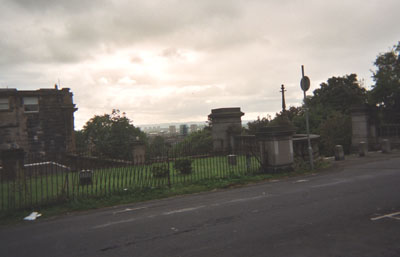
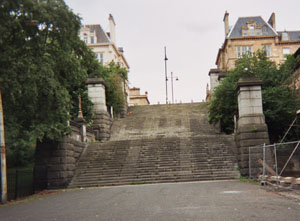
Two views of Park Terrace
The Glasgow Hostel is one of the best in my experience. It is large, clean, open day and night, adequate in all its facilities, which include bedrooms, dining-room, kitchen, laundry, and luggage storage. It maintains shelves of usefulsupplies that can be purchased. Its personnel is very competent.
Outstanding among them was the young (early 20's) Estonian girl, Kirke. This fall she will be starting a 4-year program at Edinburgh University. Her English was so good that I assumed she came from some region of Scotland or England with an unfamiliar dialect. Kirke never said, "It can't be done." She might comment, "Let's see". More often than not she would find some way to accomplish what was needed. Kirke is short;from the final hug we gave one another on the morning of my departure I concluded that she was a head or so shorter than I am. Gray jeans and pale tee shirt contrasted with a bright and cheerful oval face. I have good things also to say about the other staff members.
If there is a complaint to make about the Glasgow hostel it is that the light in all the public spaces, lounges, alcoves and so forth, is so dim that reading is very difficult when not impossible. Despite this I saw college students and others slumped into the chairs and couches, staring at virtually black pages. College students are like that; it makes one question the whole value of education. In fact there was one place in the hostel where the lighting was adequate, the basement dining room adjacent to the kitchen. When i wanted to read something I went there. I found no students there to keep me company. It wasn't, after all, a "designated" reading area.
As is the case with most youth hostels, the rooms and dorms are off limits between the hours of 10 and 2 for house-cleaning. For my first night I stayed in a single room at £30 ($60) . Then I moved to a dormitory room for the weekend, at £ 15 ($30) a night. The luggage was placed in the luggage room. Before going back into town to buy a new suitcase, I checked my pockets: Once again the wallet was lost! Kirke found it for me under a couch.
Sauchiehall Mall
The shopping mall is located about a mile away on Sauchiehall Street. Sauchiehall is the principal avenue through the heart of downtown Glasgow. Sauchiehall Street to the north of Park Terrace holds parks, museums, stately mansions and the University of Glasgow. The long commerical district to the south is rundown, crammed with shops, stores, restaurants and lots of seedy bars. The 4-block pedestrian mall begins about a mile from Park Terrace. At Dunne's department store I picked up a close cousin of the damaged suitcase for £17.
Outside the door of Dunne's I noticed a street vendor hawking a magazine written by and for the homeless: The Big Issue . The price printed on the cover was £1.20! It gave me a good feeling for the purchasing power of the pound to learn that a magazine for the homeless can be sold at this price. Try selling "Street Smarts" or "Spare Change" on a street corner in the US for $2.50 ! Having spoken with him I had to buy it.
Vendors of The Big Issue
The girl to the right is a university student from Brazil.
She was selling the magazine as part of a research project in Sociology.
With my two decades experience in street sales
she would have done better to interview me!
(There may be a certain advantage (at the beginning at least) when traveling to another country, in having a poor idea of the purchasing power of the local currency and its relationship to the exchange rate. One is thereby less inhibited in buying books, going to shows or trying restaurants that one ought to indulge in , but might be inclined to pass up if one understood their real cost.)
Back to the Hostel by 2, when I was finally able to occupy my room and catch up on sleep. The room was small but very private. To get to it I had to navigate a labyrinth of staircases, some going up, others down, into a secluded alcove on the ground floor holding only two rooms. From this standpoint the entire hostel is an Escher study in paradoxical perspective. Staircases twist about in unusual configurations throughout the building. After getting lost half a dozen times, one comes to enjoy the adventure of finding one's way about.
By 4 I was awake again, ready for another walk in grizzly rain back to the Central Station to do some food shopping at Mark and Spencer's, then write up my notes over a cup of tea in the Chapter House cafe of the Wesley-Owen bookstore. The streets along Park Terrace descend to the neighborhood of the Charing Cross train station. Nearby I discovered the Mitchell Center, a complex of library, theatre and cafe. The library houses a computer center with many monitors. Visitors are given a guest card good for a month. On my very first day in Glasgow I'd discovered a library with Internet and E-mail access, a world-class hostel, a cafe and a theatre. How's that for luck?
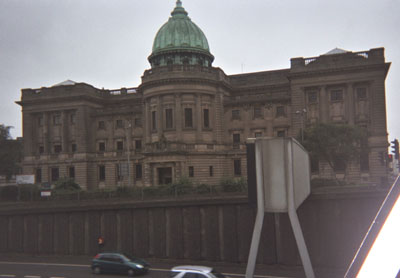
Mitchell Library and Mitchell Center
As is invariably the case, the bag was mixed ( A corollary to Wittgenstein's celebrated apothegm) : returning to the Hostel again at 6 I saw that the heel on my right shoe had almost peeled completely away, which meant that I have to buy a new pair of shoes immediately. At least the backpack was holding. It didn't need to be replaced until I reached Balloch, 4 days later!
Summarizing:
On the positive side a very good hostel with low prices for a big city, a library/theatre/cafe complex only a few blocks away; very friendly natives.
On the negative side: My wallet nearly lost at JFK ; a damaged suitcase that had to be replaced ; shoes rapidly falling apart; a backpack that could not be expected to hold up for more than a few days.
The Highland Fling ( or was it the Wild Colonial Boy? ) was up and running!
